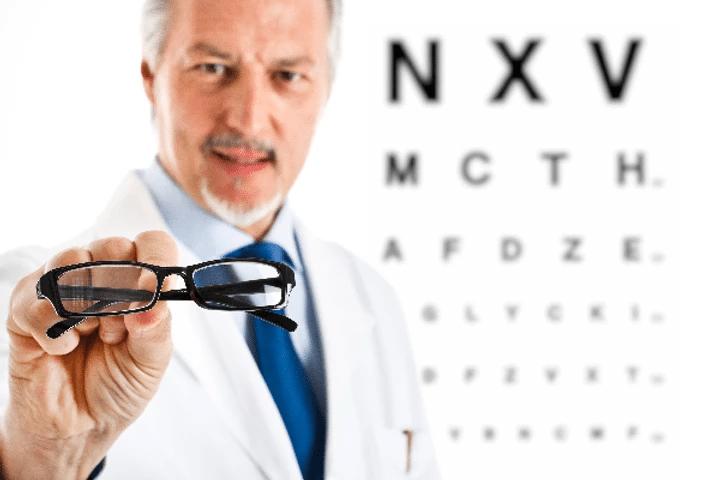Why are opticians important?
Even if you don't notice any difference in your eye health, getting your eyes tested regularly is essential to maintaining eye health. You should get your eyesight tested once every two years, as recommended by the NHS.
A short eye test allows an optician to determine the current health of your eyes, as well as detect any signs of health issues. There are many other benefits to getting an eye test and consulting with opticians, which we'll discuss in this guide.
The Different Services that Opticians Provide
The optician will carry out a series of tests throughout your appointment, while also asking you questions regarding your eyesight. It should only take around 20-30 minutes. You can also opt to undergo specialist examinations, which will add to the length of your appointment.
Within the wider optician bracket, there are several specialist fields, including:
-
Optometrist - Formally known simply as opticians, optometrists carry out the basic parts of an eye exam. This includes the visual acuity test, slit lamp examination, visual field test, and so on. Optometrists can also provide you with visual advice, help you pick appropriate glasses, and even fit the frames for you.
-
Dispensing Optician - Dispensing opticians don't carry out any of the eye examinations, but take notes from the optometrist to find and fit you the best pair of glasses.
-
Clinical Assistant - Clinical assistants are trained to perform some elements of the eye examination under the training and recommendation of the optometrist.


You are unlikely to find ophthalmologists or orthoptists in standard optician facilities. These professionals work in hospitals and are tasked with assessing eye conditions and providing surgical treatment for them.
At both independent and larger chain opticians, the main services you can receive include the following:
-
Slit-lamp exam - This involves shining a thin sheet of light into your eye. This light enhances the details of your eye and allows opticians to examine them more closely. Specifically, opticians use the slit-lamp exam to examine the health of the cornea, iris, lens and anterior chamber.
-
Visual refraction eye test - This test examines how light bends when it is sent through your cornea and lens. This not only helps the optician determine if you need glasses, but it also lets them know what kind of prescription you require. This takes place in a dark room to give the optician the best view.
-
Visual acuity test - This test involves looking at a board with different letters on it, which you are tasked with identifying. The optician will put different lenses over your eyes throughout to see if your vision is worsened or enhanced by a specific lens type. This is done to determine the strength of your sight.
-
Visual field test - This examination tests your field of vision, and also assesses how much you can see in front of you. One of your eyes will be covered, and you'll be asked to focus the other eye on a specific object. You may be asked to read or identify certain things, and also move your eyes in specific directions.
-
Optical Coherence Tomography - This new service involves taking a 3D image of your eye to check on the structure of the front and back of your eyes. It is performed to look for signs of serious conditions.
-
Contact lens assessment - The opticians will have a contact lens specialist who will be able to perform eye tests specifically performed for the wearing of contact lenses. These will assess the shape of your eye to determine the correct size of contact lenses you need to keep your eyes healthy and comfortable.
-
Glasses consultation - The service can determine the exact size of glasses frames you need to provide optimum vision and comfort.
The Benefits of Visiting Opticians Regularly
The NHS recommends going to the opticians once every two years (or more regularly if you're a driver) for several reasons.
Not only does it give you a chance to ask questions about your eyesight, but it also helps with the following:
Prevents sight loss
Sometimes sight loss is unnoticeable. Sometimes, it takes a professional to spot your worsening eye conditions. By spotting your worsening vision early, an optician can prescribe you glasses or contact lenses, which will help prevent you from losing any more sight.
Helps spot conditions or diseases early
Some eye conditions and diseases don't come with obvious symptoms. By spotting cataracts, glaucoma or age-related macular degeneration early, the effects of these diseases can be made less severe.
To update your glasses or contact lenses
Wearing the wrong glasses or contact lenses can lead to sight loss, and also cause headaches, dizziness, and even neck pains. Getting your eyes tested allows you to find out the current state of your vision. By doing this, you can order the correct glasses or contact lenses.

The Risks of Not Visiting the Opticians Regularly
The main risks of not visiting the opticians regularly include the following:
Discomfort at work
If you sit staring at a computer screen all day, you need to get your eyes tested regularly. Extended screen time can lead to subtle deterioration, which you may not notice. If you don't get your eyes tested, you may start to experience severe headaches or dizzy spells while working.
Severe eye health trouble
When a serious eye condition is allowed to develop, it can lead to serious problems - in the worst cases, blindness. Further tests could be arranged to inspect the affected areas more closely.
The development of other diseases
While one of the main focuses of eye tests is to spot optical-related diseases, eye examinations can also be used to spot much more life-threatening problems.
Eye examinations can be used to spot high blood pressure, cholesterol, tumours, diabetes, and even arthritis.
Book your eye test today
If you spend too much time in front of a computer screen or feel like your eyesight is getting worse, book an early eye appointment with your local opticians today. This can be done through Book an Eye Test. Not only will this help to keep your eyes healthy, but it will also help prevent the development of serious eye conditions.
For more information on how to keep your eyes healthy, check out our vision care and eye health information blogs.
Related articles








